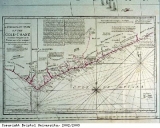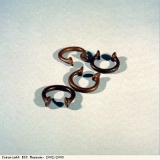John Hippisley
John Hippisley was the son of a Bristol man. His father ran the theatre in Jacob’s Wells Road in Bristol in the mid 18th century. John Hippisley had worked as an official of the Company of Merchants Trading to Africa. This group in 1750 took over the role of the Royal African Company in maintaining and running the trading forts along the west coast of Africa. The forts, shown on the map here, were owned by European companies to act as trading bases for the slave ships and traders operating in the area. There were 89 Liverpool merchants as members, 157 London merchants and 237 Bristol merchants. Hippisley worked in the trading forts in West Africa for some years. He wrote an essay about the slave trade in 1766. He accepted that the slave trade involved cruelty, but argued that it was vital to British trade. As he felt that it could not be abandoned, therefore, it should be as humane as possible. Part of his essay read as follows:
“To declaim upon the horrors of this trade would have been beside the question, and as far as I can see, could have answered no good purpose: for the impossibility of doing without slaves in the West-Indies [Caribbean] will always prevent this traffick [slave trade] being dropped. The necessity, the absolute necessity, then, of carrying it on, must, since there is not other, be its excuse. We would not, however, be quite silent upon this occasion. A hint will be forgiven by those who do not need it, in consideration of those who (Perhaps) do. We hope then, it will be ever remembered that the traffick is in human creatures; that sensibility and deep reflection upon their sad state do not operate very powerfully among the negroes; yet they are not totally devoid of them; that certain ties there are, which, when broken, affect even brutes; and that feeling, bodily feeling at least, is the portion of everything that has life. Shall we then forget that many of these poor creatures, to say nothing of their common misfortune, in leaving their native country for ever, have been torn from the woman, the child, the parent that they loved? Circumstances of so piteous a nature, as, instead of inspiring wanton cruelty, or cold neglect, should teach the white possessors to soften the misery of their condition by every safe and reasonable indulgence that their humanity can suggest, and that the nature of the case will admit.”




